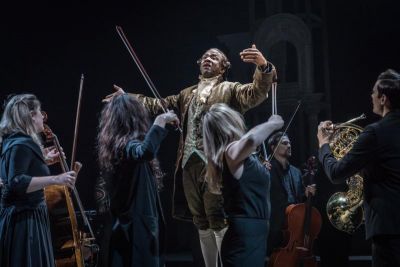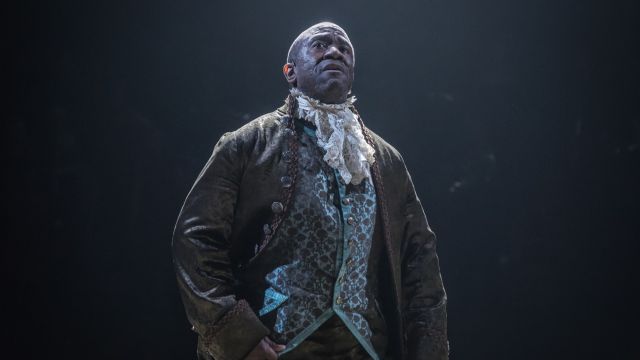Amadeus
This sumptuous production of Peter Shaffer’s 1979 play is no mere ‘revival’. With sixteen actors, six singers and twenty musicians of the Southbank Sinfonia mixing it with the action, director Michael Longhurst makes the play a sprawling Singspiel spectacle.
Nevertheless, he maintains the tight focus on the central characters Antonio Salieri and Wolfgang Amadeus Mozart. While Adam Gillen assays the coarse idiot savant version of Mozart that the text requires, Lucian Msamati gives us a Salieri of great subtlety. He reveals that the blank-faced sycophantic but scheming courtier is also the man enraged that God has welched on the deal to give him genius, and then again, a man privately wracked by guilt at what he is doing to destroy his rival. Mr Msamati makes Salieri a very human ambivalent villain, but he also finds much ironic humour in the role, which, in turn, makes him what he shouldn’t be: a sympathetic character. In a pre-play presentation, Mr Msamati says that if we can’t see past the colour of his skin to the character, that’s our problem. It turns out to be no problem at all. Within moments we have almost forgotten that Mr Msamati is, after all, black. All that is left is a trace awareness that Salieri, despite his status and prestige, is an outsider, a man of humble origins who has diligently, doggedly risen to his position only to have it threatened by another outsider – Mozart.
Mr Gillen’s Mozart, however, I found a little hard to take. Until way into the second half, there’s not much light and shade in his performance. Mostly he shouts; he lopes about, he climbs on furniture. Does he have Asperger’s? Mr Gillen pursues the impossibility of this creature being a musical genius so relentlessly and so consistently that he leaves himself no room and is quite quickly irritating – as are the ‘contemporary’ references in costume and behaviour to the Sex Pistols, et al. (Iconoclasts, get it?) Given this version of the character (more extreme than Tom Hulce’s in the movie), the embrace of the Masons seems even more extraordinary.
Karla Crome, meanwhile, as Constanza, gives us a beautifully judged picture of the provincial girl from the lower orders, but one endowed with native wit and a great ability (greater than Mozart’s) to assess character and see what’s what. Tom Edden’s Joseph II hits all the right notes as a ruler with great power and little intelligence. Otherwise the nobles – played by Alexandra Mackie, Hugh Sachs and Geoffrey Beevers, in more or less functional roles – do what is necessary with complete professionalism.
 Chief among the singers is soprano Fleur de Bray as Salieri’s pupil Katherina Cavalleri; she gets the Queen of the Night aria), supported by Wendy Dawn Thompson, Peter Willcock, Eamonn Mulhall, Robyn Allegra Parton and Matthew Hargreaves. All are quicksilver adaptable, in various roles and guises, as well as merely singing.
Chief among the singers is soprano Fleur de Bray as Salieri’s pupil Katherina Cavalleri; she gets the Queen of the Night aria), supported by Wendy Dawn Thompson, Peter Willcock, Eamonn Mulhall, Robyn Allegra Parton and Matthew Hargreaves. All are quicksilver adaptable, in various roles and guises, as well as merely singing.
This is a play centrally about genius and the envy of the mediocre - an eternal theme. For Shaffer, his theme is more important than any historical accuracy – which I am certainly not demanding. With a great deal of dramatic licence, he uses the barest outline of ‘what really happened’ to make his case. If that case were a mere matter of envy it would not be so compelling. After all, many ‘creative’ people in music, and in literature, in the visual arts, and in show business are envious of their colleagues’ success, but their envy is so often only of the status or fame or financial rewards. (‘Why is she/he famous? I’m as good as – better – than her/him!’) Salieri’s curse is that he knows that Mozart is a genius, knows exactly why and how Mozart’s music is better than his, and it is that that makes his envy worse than corrosive. What perhaps limits the play’s argument is that Salieri’s quarrel is with God and he attributes Mozart’s genius to God. For Salieri, there can be no other explanation for that genius when Mozart is a noisy, disruptive, disrespectful, foul-mouthed, lurching child. This element of unjust divine intervention rather limits Shaffer’s case, passing over Mozart’s (that is the real Mozart’s) technical ability and discipline, and the crucial contributions of his librettists, da Ponte and Schikaneder to mention only the greatest.
That minor flaw, if it is a flaw, is an afterthought for the audience as Mr Longhurst, his designer Chloe Lamford, his lighting designer Jon Clark and choreographer Imogen Knight make marvellous use of the Olivier theatre’s wide and deep stage. It’s hard to say what the live audience in the theatre makes of it, but for us watching the broadcast version the stage is constantly but so smoothly transforming – from Palace, to opera house, to private apartments, to busy Vienna streets. At one moment, the musicians swarm about the stage; the next they are in an orchestra pit for a performance of Cosi or Die Zauberflöte, andthe next the common folk of Vienna jostling in the street. The energy and invention are constant. And then there is Mozart’s music, both ‘dark’ and ‘light’, and supplemented by Simon Slater’s incidental touches, particularly effective as Mozart’s fortunes go into decline.
Even so, and I hope I can say this with all due respect to the late Mr Shaffer, Amadeus is just too long. That’s not a matter of modern short attention spans. No, it’s a matter of Salieri telling the audience (explaining) too often what is already perfectly evident – and then repeating himself as well.
That said, the sheer stage craft on show, the mostly witty and moving performances, the wonderful design, the sound and music easily carry the audience over the play’s flaws. It is as much spectacle as the dramatization of Mr Shaffer’s argument and all the better for it.
Michael Brindley
Photographer: Marc Brenner
Subscribe to our E-Newsletter, buy our latest print edition or find a Performing Arts book at Book Nook.

